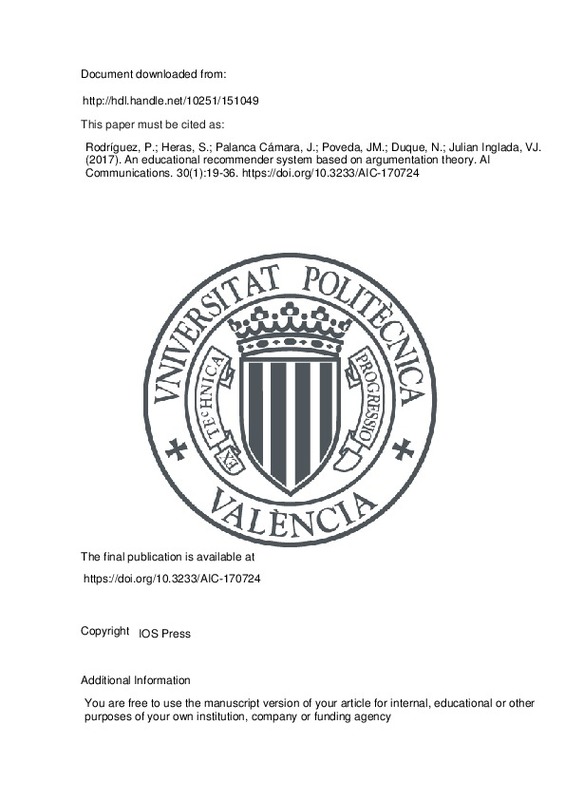Briguez, C. E., Budán, M. C. D., Deagustini, C. A. D., Maguitman, A. G., Capobianco, M., & Simari, G. R. (2014). Argument-based mixed recommenders and their application to movie suggestion. Expert Systems with Applications, 41(14), 6467-6482. doi:10.1016/j.eswa.2014.03.046
BRIGUEZ, C. E., CAPOBIANCO, M., & MAGUITMAN, A. G. (2013). A THEORETICAL FRAMEWORK FOR TRUST-BASED NEWS RECOMMENDER SYSTEMS AND ITS IMPLEMENTATION USING DEFEASIBLE ARGUMENTATION. International Journal on Artificial Intelligence Tools, 22(04), 1350021. doi:10.1142/s0218213013500218
R. Burke, Hybrid recommender systems: Survey and experiments, User Modelingand User-Adapted Interaction (2002).
[+]
Briguez, C. E., Budán, M. C. D., Deagustini, C. A. D., Maguitman, A. G., Capobianco, M., & Simari, G. R. (2014). Argument-based mixed recommenders and their application to movie suggestion. Expert Systems with Applications, 41(14), 6467-6482. doi:10.1016/j.eswa.2014.03.046
BRIGUEZ, C. E., CAPOBIANCO, M., & MAGUITMAN, A. G. (2013). A THEORETICAL FRAMEWORK FOR TRUST-BASED NEWS RECOMMENDER SYSTEMS AND ITS IMPLEMENTATION USING DEFEASIBLE ARGUMENTATION. International Journal on Artificial Intelligence Tools, 22(04), 1350021. doi:10.1142/s0218213013500218
R. Burke, Hybrid recommender systems: Survey and experiments, User Modelingand User-Adapted Interaction (2002).
Chesñevar, C., Maguitman, A. G., & González, M. P. (2009). Empowering Recommendation Technologies Through Argumentation. Argumentation in Artificial Intelligence, 403-422. doi:10.1007/978-0-387-98197-0_20
Drachsler, H., Verbert, K., Santos, O. C., & Manouselis, N. (2015). Panorama of Recommender Systems to Support Learning. Recommender Systems Handbook, 421-451. doi:10.1007/978-1-4899-7637-6_12
N.D. Duque, D.A. Ovalle and J. Moreno, Objetos de aprendizaje, repositorios y federaciones... conocimiento para todos. Universidad Nacional de Colombia, 2015.
Dwivedi, P., & Bharadwaj, K. K. (2013). e-Learning recommender system for a group of learners based on the unified learner profile approach. Expert Systems, 32(2), 264-276. doi:10.1111/exsy.12061
GARCÍA, A. J., & SIMARI, G. R. (2004). Defeasible logic programming: an argumentative approach. Theory and Practice of Logic Programming, 4(1+2), 95-138. doi:10.1017/s1471068403001674
Gunawardana, A., & Shani, G. (2015). Evaluating Recommender Systems. Recommender Systems Handbook, 265-308. doi:10.1007/978-1-4899-7637-6_8
Heras, S., Botti, V., & Julián, V. (2012). Argument-based agreements in agent societies. Neurocomputing, 75(1), 156-162. doi:10.1016/j.neucom.2011.02.022
Heras, S., Rebollo, M., & Julián, V. (s. f.). A Dialogue Game Protocol for Recommendation in Social Networks. Hybrid Artificial Intelligence Systems, 515-522. doi:10.1007/978-3-540-87656-4_64
P.A. Kirschner, S.J. Buckingham-Shum and C.S. Carr, Visualizing Argumentation: Software Tools for Collaborative and Educational Sense-Making, Springer Science & Business Media, 2012.
Klašnja-Milićević, A., Ivanović, M., & Nanopoulos, A. (2015). Recommender systems in e-learning environments: a survey of the state-of-the-art and possible extensions. Artificial Intelligence Review, 44(4), 571-604. doi:10.1007/s10462-015-9440-z
Learning Technology Standards Committee, IEEE Standard for Learning Object Metadata, Institute of Electrical and Electronics Engineers, New York, 2002.
Leite, W. L., Svinicki, M., & Shi, Y. (2009). Attempted Validation of the Scores of the VARK: Learning Styles Inventory With Multitrait–Multimethod Confirmatory Factor Analysis Models. Educational and Psychological Measurement, 70(2), 323-339. doi:10.1177/0013164409344507
Li, H., Oren, N., & Norman, T. J. (2012). Probabilistic Argumentation Frameworks. Lecture Notes in Computer Science, 1-16. doi:10.1007/978-3-642-29184-5_1
CACM Staff. (2009). Recommendation algorithms, online privacy, and more. Communications of the ACM, 52(5), 10-11. doi:10.1145/1506409.1506434
Ossowski, S., Sierra, C., & Botti, V. (2012). Agreement Technologies: A Computing Perspective. Agreement Technologies, 3-16. doi:10.1007/978-94-007-5583-3_1
Palanca, J., Heras, S., Jorge, J., & Julian, V. (2015). Towards persuasive social recommendation. ACM SIGAPP Applied Computing Review, 15(2), 41-49. doi:10.1145/2815169.2815173
Recio-García, J. A., Quijano, L., & Díaz-Agudo, B. (2013). Including social factors in an argumentative model for Group Decision Support Systems. Decision Support Systems, 56, 48-55. doi:10.1016/j.dss.2013.05.007
Rodríguez, P., Duque, N., & Ovalle, D. A. (2015). Multi-agent System for Knowledge-Based Recommendation of Learning Objects Using Metadata Clustering. Communications in Computer and Information Science, 356-364. doi:10.1007/978-3-319-19033-4_31
Rodríguez, P. A., Ovalle, D. A., & Duque, N. D. (2015). A Student-Centered Hybrid Recommender System to Provide Relevant Learning Objects from Repositories. Learning and Collaboration Technologies, 291-300. doi:10.1007/978-3-319-20609-7_28
M. Salehi, M. Pourzaferani and S.A. Razavi, Hybrid attribute-based recommender system for learning material using genetic algorithm and a multidimensional information model, Egyptian Informatics Journal (2013).
Sikka, R., Dhankhar, A., & Rana, C. (2012). A Survey Paper on E-Learning Recommender System. International Journal of Computer Applications, 47(9), 27-30. doi:10.5120/7218-0024
Sinha, R., & Swearingen, K. (2002). The role of transparency in recommender systems. CHI ’02 extended abstracts on Human factors in computing systems - CHI ’02. doi:10.1145/506443.506619
Van de Sompel, H., Chute, R., & Hochstenbach, P. (2008). The aDORe federation architecture: digital repositories at scale. International Journal on Digital Libraries, 9(2), 83-100. doi:10.1007/s00799-008-0048-7
Vekariya, V., & Kulkarni, G. R. (2012). Notice of Violation of IEEE Publication Principles - Hybrid recommender systems: Survey and experiments. 2012 Second International Conference on Digital Information and Communication Technology and it’s Applications (DICTAP). doi:10.1109/dictap.2012.6215409
[-]







![[Cerrado]](/themes/UPV/images/candado.png)


